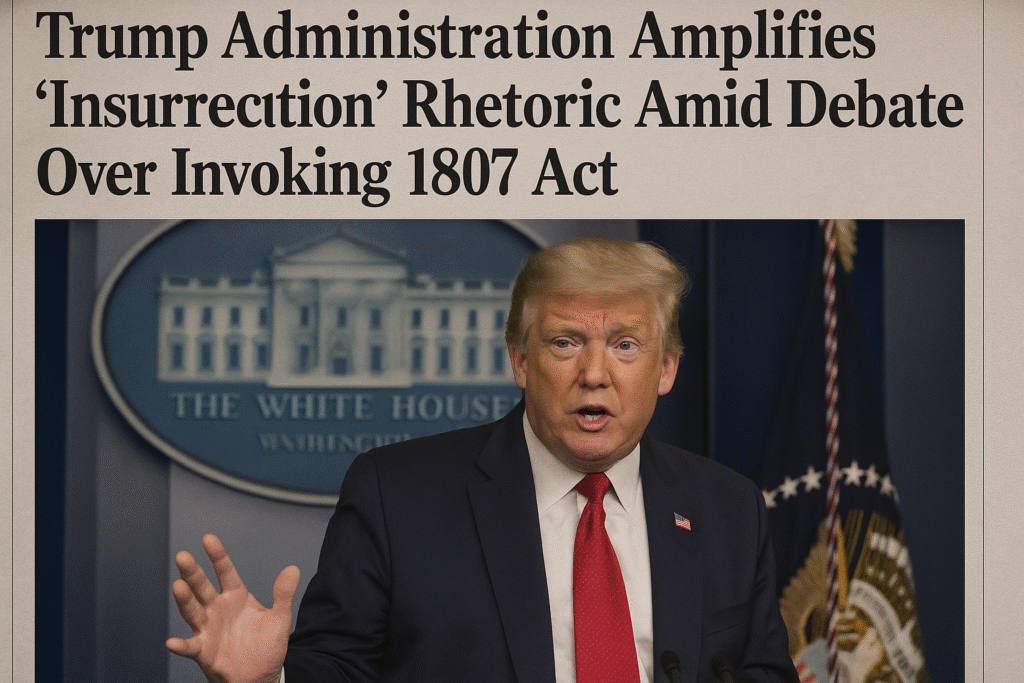By Harshit | October 10, 2025 | Washington D.C. | 6:10 AM EDT
Trump Expands Use of “Insurrection” Label
President Donald Trump and his top aides have escalated a targeted rhetorical campaign, increasingly branding their political opponents, liberal groups, and even court rulings as forms of “insurrection.” The word — historically associated with armed uprisings — has become central to the administration’s framing of domestic unrest as it weighs invoking the Insurrection Act, a rarely used 1807 law that would allow active-duty military deployments for law enforcement inside the United States.
Trump and deputy chief of staff Stephen Miller have used the label in reference to protesters in Portland and Los Angeles, attacks on immigration officers, and rulings blocking the administration’s immigration and security policies. At times, Trump has gone further, describing Democrats themselves as “insurrectionists.”
The timing is significant: multiple administration officials confirmed this week that the White House has seriously discussed invoking the Insurrection Act, which was last used more than 30 years ago during the 1992 Los Angeles riots.
Jan. 6, 2021 Riot Excluded
One event the administration does not classify as an insurrection is the January 6, 2021 attack on the U.S. Capitol, when rioters disrupted the certification of Joe Biden’s 2020 election victory.
Trump’s lawyers have consistently argued before courts that the attack was not an insurrection. During a ballot challenge in Colorado last year, Trump’s legal team insisted the incident lacked the organized effort to overthrow the government that would define an insurrection. Instead, the former president has repeatedly characterized the 2020 election as the “real insurrection” and described Jan. 6 as a “day of love” from the perspective of his supporters.
This week, Donald Trump Jr. echoed that view, telling Newsmax: “They want to call someone who took a selfie within 200 miles of D.C. an insurrectionist on Jan. 6, but directly threatening to withhold help from federal law enforcement doing their job, that’s insurrection.”
Broad Presidential Powers Under the Act
Despite the heavy political weight attached to the term, legal experts note that the Insurrection Act itself does not rely on a strict definition of “insurrection.” Walter Olson, a senior fellow at the libertarian Cato Institute, told NBC News that the law grants wide latitude to the president.
Trump could invoke it if states are deemed unable or unwilling to protect constitutional rights, if civil society has broken down, or if federal law cannot otherwise be enforced. Unlike other emergency powers, the act imposes no time limits and does not require congressional review, making it a particularly far-reaching tool.
“This would be a momentous step,” Olson said. “It would go much further into using U.S. military against U.S. citizens than most emergency authorities allow.”
Republican Unease
Not all Republicans are comfortable with the possibility. Senate Majority Leader John Thune (R-S.D.) said Thursday he wasn’t sure invoking the act was “necessary.” Senator Thom Tillis (R-N.C.) called the move an “overreach,” although he added that if he were part of the administration, he might still “push the same envelope.”
Tillis emphasized that the act was originally intended for circumstances threatening to overwhelm democracy itself — not as a tool for routine urban unrest.
Expanding the Rhetoric
Trump and Miller’s broad application of the term “insurrection” has extended well beyond protests. They have described unfavorable court rulings as “legal insurrection,” including a recent decision blocking the administration from federalizing National Guard troops in Portland.
Miller has also labeled actions by Democratic mayors, such as Los Angeles Mayor Karen Bass’s resistance to immigration raids, as “rhetoric of insurrection.” In online posts, he accused Democratic “rioters” of waging violent insurrection and said liberal groups engaging in protests should face conspiracy or RICO charges.
Even in meetings with foreign leaders, Trump has used the label. This week, while praising a Republican-backed tax and spending bill, Trump told Canadian Prime Minister Mark Carney that Democrats opposing the measure were “like insurrectionists.”
White House Defense
White House spokeswoman Abigail Jackson defended the language, framing it as part of Trump’s broader law-and-order agenda.
“President Trump will not turn a blind eye to the lawlessness plaguing American cities,” she said in a statement. “And if the Democrats’ only response to the President rightfully restoring law and order is to keep pointing to January 6, they’re even more out-of-touch and broken brained than we realized.”
Outlook
As the administration doubles down on “insurrection” rhetoric, the legal and political stakes continue to rise. If Trump does invoke the Insurrection Act, it would represent one of the most aggressive uses of presidential power in modern history, placing active-duty U.S. troops in American cities over the objections of governors and local officials.
Whether that move materializes remains uncertain. But by broadening the scope of what counts as insurrection — from protesters to court rulings to Democrats themselves — the Trump administration has sharpened the battle lines in a debate that blends law, politics, and the future of American democracy.

